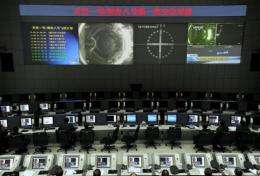Chinese scientists monitor the docking of the Tiangong-1 space lab module and the Shenzhou VIII spacecraft in space at the Jiuquan Satellite Launch Centre in the northwestern province of Gansu on November 3. China placed two satellites in orbit on Sunday, including a spacecraft that will collect and relay data for disaster relief efforts, state press reported.
China placed two satellites in orbit on Sunday, including a spacecraft that will collect and relay data for disaster relief efforts, state press reported.
The two satellites were successfully launched aboard a Long March carrier rocket, China's main space launch vehicle, from northwest China's Jiuquan satellite launch centre, Xinhua news agency said.
The Chuangxin 1-03 satellite, developed by the Chinese Academy of Sciences, will collect and relay water conservation, hydrological and meteorological data, plus data for disaster relief efforts, the report said.
The Shiyan-4, developed by the Chinese Research Institute of Space Technology, is an experimental satellite which will study the earth's environment and test new space technologies, it added.
Sunday's launch comes after China's unmanned spacecraft Shenzhou VIII returned to Earth on Thursday after completing two space dockings that have pushed forward the nation's plan to build a space station by 2020.
Shenzhou VIII, which means "divine vessel" in Chinese, took off from northwest China on November 1, and docked with the Tiangong-1 experimental module twice in the nation's first ever "kiss" in space.
China sees its space programme as a symbol of its global stature, growing technical expertise, and the Communist Party's success in turning around the fortunes of the once poverty-stricken nation.
China is expected to launch two more spacecraft next year to dock with Tiangong-1 -- the Shenzhou IX and Shenzhou X -- at least one of which will carry astronauts on board.
(c) 2011 AFP





















